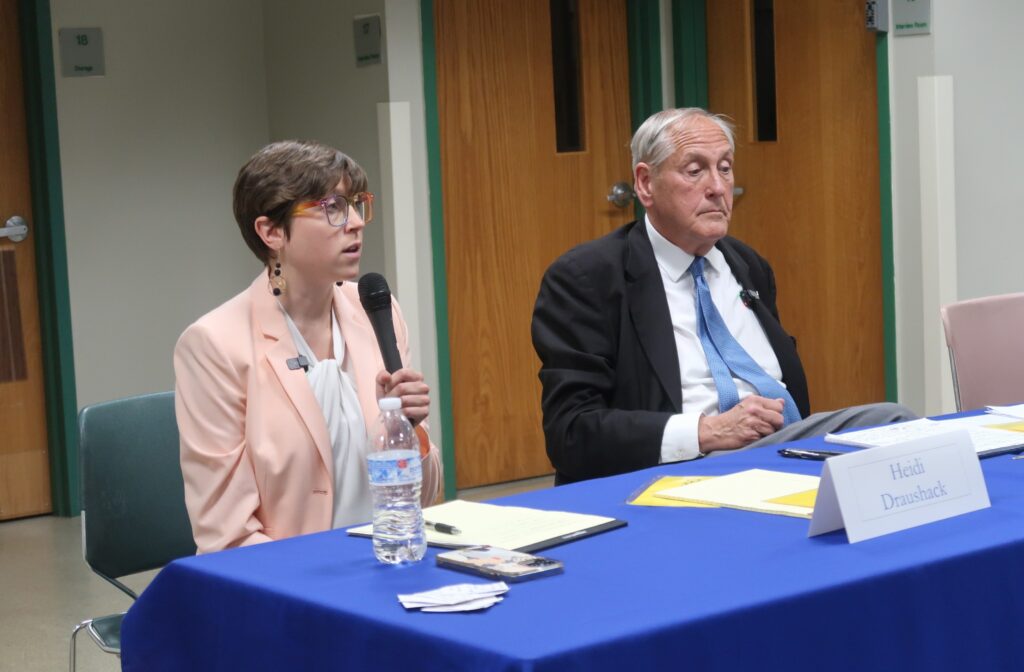Candidates for the state senate clash on corporate campaign contributions

Heidi Drauschak, a candidate for the 35th District in the Virginia Senate, told the audience at a forum May 16 that one of her top priorities is campaign finance reform and that she won’t accept money from Dominion Energy or other corporations.
She is challenging Sen. Dave Marsden in the Democratic Primary on June 20. The 35th District covers large parts of the Mason and Braddock districts.
Contributions from Dominion
Marsden also said he supports legislation banning Dominion from making campaign contributions, but has accepted $101,235 from Dominion. “I’ve never let corporations influence my decisions,” he said.
Dominion has spent heavily on campaign contributions, which has resulted in lots of legislation favoring the utility, Drauschak said. Allowing contributions from a state-regulated utility “is a huge conflict of interest that needs to end.”
If a candidate accepts corporate money, there’s an understanding that there’s a relationship, she said. “Corporations need to be part of the conversation but at the same level as residents and voters.”
Drauschak said Virginia is only one of two states where politicians can raise money from anywhere and can spend it on anything. “We need to limit the amount of money coming in and people need to know where it’s coming from.”
Marsden also supports a limit on campaign contributions and proposed an option for public funding for campaigns, so candidates don’t have to rely on corporate or personal contributions. “We have to ensure that not only the rich can run.”
Family leave
Another priority for Drauschak is three months of paid family leave. After giving birth to a son three weeks ago, she said she understands why it is so important for mothers and fathers of newborns to have adequate paid leave.
Marsden also supports paid family leave, and they both support raising the minimum wage. Those policies are not anti-business or anti-growth, Drauschak said. “Companies that take care of their workers see more profit and growth and have happier workers.”
“You can never go wrong with giving people paid leave. It is not anti-business,” Marsden said. “You can create a work and living environment that makes Virginia a place everyone wants to come to.”
Support for workers
Both candidates support the repeal of Virginia’s right-to-work law. Marsden said it needs to be done intelligently without harming the state’s ability to attract major industries. Now that localities can engage in collective bargaining, “we are on the road to repealing right-to-work.”
Drauschak said an immediate repeal is “absolutely a priority for me,” noting the decline of unions “created an enormous amount of income inequality.” She said, “There is no reason why Virginia can’t be the best state to do business and the best state to work.”
Both candidates spoke strongly about the need to fight Republicans’ attempts to restrict abortions and both support a constitutional amendment to protect women’s reproduction rights. Both also support tighter restrictions on guns.
Marsden and Drauschak said they would work to increase funding for education. Marsden called for coming up with a new way to allocate funds to high-needs schools, such as those in Mason District.
Drauschak said education funding should be the top priority for the General Assembly, suggesting that new streams of revenue from gambling and the legalization of marijuana could be directed toward schools.
When asked how they would use technology to communicate with constituents, Marsden, a member of the Boomer generation, said he favors using the telephone, while the much-younger Drauschak said there are many new ways to use technology for outreach, such as OpenGov.
The candidate forum was hosted by the Mason District Democratic Committee and Network NOVA. The winner of the Democratic Primary will face Republican Mark Vafiades in November.

